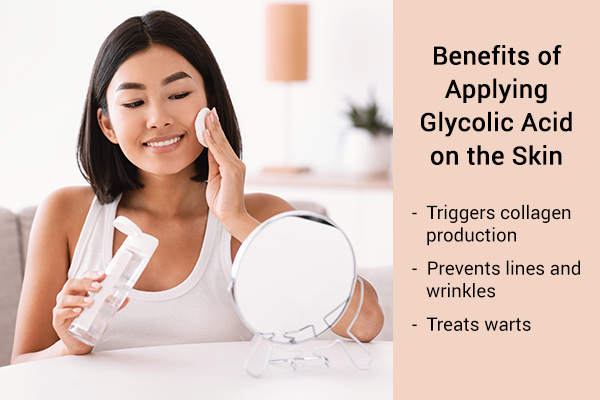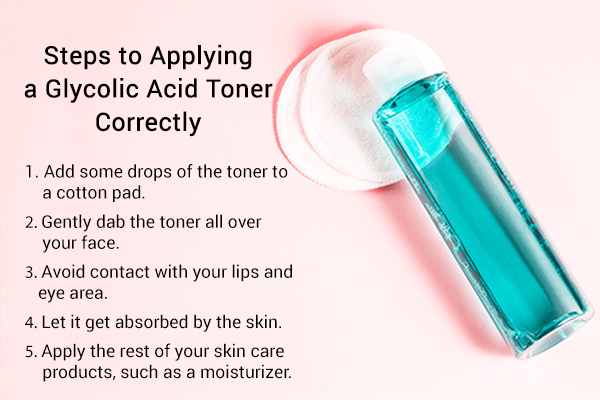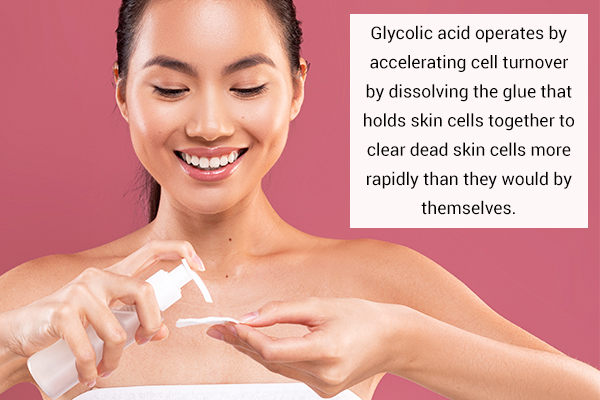In this article:
Glycolic acid is a popular ingredient in the skin care world and comes under the umbrella of alpha-hydroxy acids (AHAs). According to experts, the majority of people can use glycolic acid topically safely.

However, if you have dry or sensitive skin, dermatologists warn that you may find glycolic acid to be a bit irritating for your skin. This might limit its use in some people with sensitive skin.
So, the best way to know if a glycolic acid toner is okay for you or not is to test it on a small area of skin to see if causes irritation. This is called a patch test and is highly recommended by skin experts.
However, experts also add that if glycolic acid is used in a concentration suitable for your skin, it can be helpful.
This article will discuss everything about glycolic acid, from how much to use and how to use it safely if you have sensitive skin.
Scientific Studies on Glycolic Acid for Sensitive Skin
Here’s what research has found out about the use of glycolic acid on sensitive skin.
Increased sun sensitivity
Researchers have demonstrated that the topical use of AHAs such as glycolic acid, in a concentration of more than 2%, can worsen skin photosensitivity, which means the skin becomes increasingly sensitive to sun exposure. (1)(2)
So, if your skin is already sensitive, glycolic acid at such a concentration can exacerbate the condition.
Skin pigmentation
In rare cases, exposure to sunlight after the application of AHAs can even cause uneven skin pigmentation. (1)(2)
Stinging effect
A study found that AHAs may have a stinging effect when used on sensitive skin. Glycolic acid, being an AHA, can therefore cause the same. (3)
Concentration of glycolic acid to be used on sensitive skin
For individuals with sensitive skin, it is important to use a lower concentration of glycolic acid.
According to a study, while glycolic acid can be slightly irritating, it is less irritating than other AHAs. Researchers recommended concentrations of up to 1.5% and avoiding concentrations higher than 1.5% as they can increase the potential for irritation in sensitive skin. (3)
Another study highlighted that using high concentrations of glycolic acid (3% and 5%) can cause skin irritation and even chemical burns. (1)
So, it is better to use glycolic acid in concentrations of 1%–2%, especially if you have sensitive skin.
Beneficial Effects of Topical Glycolic Acid on the Skin

Glycolic acid is a water-soluble AHA and is a natural product derived from plant sources. It is one of the most widely used AHAs in the skin care world. (4)
Here are some beneficial effects of glycolic acid on your skin.
1. Triggers collagen production
Aging causes a decrease in skin collagen production. Collagen is also destroyed by factors other than aging like sun exposure. Using glycolic acid can be helpful in discouraging and preventing the deterioration of collagen.
Glycolic acid triggers the skin to produce collagen which is a protein necessary for skin health as it strengthens the skin and makes it plump and elastic. (1)
2. Prevents lines and wrinkles
The skin is prone to the negative effects of aging such as fine lines and wrinkles, which form over time. It is a biological process, but people often don’t like lines on their skin and find ways to remedy them. Glycolic acid may help in this issue.
According to a study, glycolic acid may increase the skin levels of hyaluronic acid, which keeps the skin moisturized. It also triggers the production of collagen, which maintains skin integrity. Furthermore, it can aid in skin repair and regeneration.
All these actions lower the signs of aging including fine lines and wrinkles. (5)
3. Treats warts
Warts are small growths on the skin that may arise because of viruses. In a study that evaluated the use and benefit of 15% glycolic acid on HIV-positive subjects with warts, glycolic acid flattened and regularized the color of warts and cleared them too in some patients.
Other studies have also showcased that 15% glycolic acid with salicylic can help treat these warts. (6)
Can Glycolic Acid Be Used Daily?
It is best to start with a lower-strength glycolic acid toner if you are using it for the first time and don’t know yet how it will work for your skin, because if you immediately use it frequently or every day, you may experience irritation.
If after a few uses your skin feels healthy and shows no indications of adverse reactions, you can gradually increase its use.
Note: Remember to never exceed the use of glycolic acid by what’s specified on the label or what your doctor advised.
How to Use Glycolic Acid for Both Normal and Sensitive Skin

Here’s the right way of applying a glycolic acid toner for all skin types, including sensitive skin:
- Add some drops of the toner to a cotton pad.
- Gently dab the toner all over your face.
- Avoid contact with your lips and eye area.
- Let it get absorbed by the skin.
- Apply the rest of your skin care products, such as a moisturizer.
Note: Since glycolic acid can make the skin sensitive to sun exposure, applying sunscreen is a must before heading out.
Sunscreen is a must with glycolic acid use
A study observed that topical application of 10% glycolic acid for 12 weeks increased skin sensitivity to UV light from the sun and the formation of sunburn cells.
A study also showed that treatment with glycolic acid resulted in an increase in erythema, DNA damage, and sunburn cell formation.
So, experts suggest implementing a strong sun protection routine with glycolic acid use, especially in people with sensitive skin. (1)(2)(3)
How Does Glycolic Acid Work?

Glycolic acid has very small-sized molecules of AHAs that enable its absorption into the skin. Glycolic acid operates by accelerating cell turnover by dissolving the glue that holds skin cells together to clear dead skin cells more rapidly than they would by themselves.
Does Glycolic Acid Have Side Effects?
The side effects of glycolic acid may include a stinging sensation and redness. (7)
Final Word
Glycolic acid is an alpha hydroxy acid, which, when absorbed by the skin, promotes cell turnover and thus gives you healthy, plump-looking skin. It is a familiar ingredient in numerous OTC skin care products, particularly antiaging products.
However, glycolic acid can have adverse effects on sensitive and dry skin, such as irritation. Hence, it should be used carefully upon the advice of a professional.
- Was this article helpful?
- YES, THANKS!NOT REALLY


